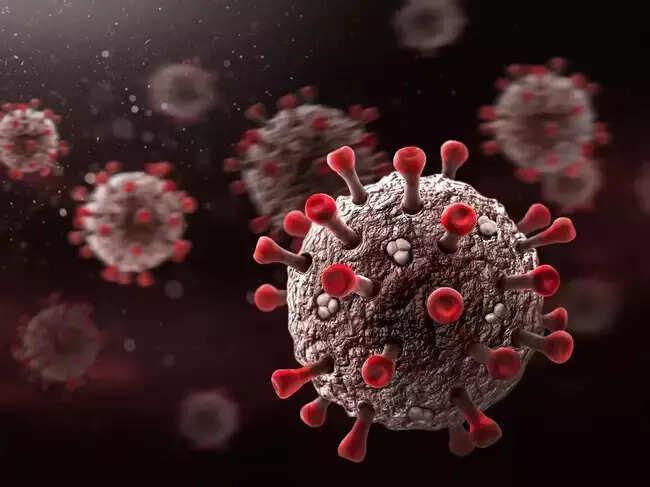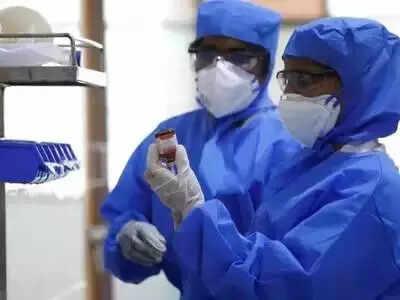[ad_1]

New Delhi: As the world was gearing to put the COVID-19 pandemic into the rearview, the ever-mutating virus has once again set alarm bells ringing globally with countries like Japan, the US, the Republic of Korea, Brazil and China reporting a surge in infections. The Omicron sub-variant BF.7 being highly transmissible is rapidly increasing in many parts of the world and has become the most dominant variant. BF.7 has reinstated that the pandemic is far from over and the world needs to stay vigilant in its approach to combat the virus. Hospitals across India have been put on high alert for any possible surge in COVID-19 cases amid growing concerns about the new BA.7 variant.
Speaking to ETHealthworld healthcare experts informed that ramping up genomic sequencing is the most important way to tackle Omicron BF.7 and masking up and adhering to COVID-appropriate behaviour can prevent the spread of infections that could lead to another surge in the country.
Emphasising the importance of genome sequencing, Dr Sandeep Budhiraja, Group Medical Director, Max Healthcare said, “Firstly, India needs to restart following the basic COVID-19 protocols which include social distancing, using masks in public gatherings, hand hygiene and avoiding large congregations of people. Governments must ensure that the vaccines are adequately stocked and available and that people are encouraged to take the COVID vaccination (two plus one). Also, we must ensure that there is adequate testing of people happening and the focus should be on genome sequencing of samples. So that, if there is any mutant emerging, we recognise it fast. To summarise, the typical process of diagnosis and then following up on cases of patients, stocking enough vaccines, diagnostic tests and the basic control measures are key. If we see significant positive cases up-shoot from a particular place, we may have to institute isolation protocols there. But, overall I don’t think there is any situation to panic about. Hopefully, we won’t witness the situation China is facing because people’s immune response against COVID-19 is much better here.”
Endorsing Dr Budhiraja’s views, Dr Sanjith Saseedharan, Consultant & Head-Critical Care, SL Raheja Hospital, Mahim-A Fortis Associate, Mumbai is of the view that precautions need to be taken at two levels, one at the government and the other on an individual level.
Dr Saseedharan commented, “The government can increase genomic analysis for a larger number of patients to detect potentially more dangerous mutations that may occur due to the rising infection rate in China. On an individual level, it is important to realise that the elderly, immunocompromised patients and individuals with co-morbidities are at higher risk of experiencing severe illness and poor outcomes if they contract COVID-19. It is crucial for these individuals to take extra precautions, such as getting vaccinated, taking booster shots, wearing masks, avoiding crowded places, and following COVID-19 appropriate behaviour in order to reduce their risk of infection.”
Alerting that the new variant can spread fast like the other variants, Dr Amitabha Ghosh, Consultant, Internal Medicine, Manipal Hospitals, Gurugram, said, “One needs to take the same precautions that were taken during the second wave of Omicron (last year in January).”
Impact of COVID-19 vaccines on BF.7
Commenting that it is too early to access the impact on whether the vaccines will have an effect on the new variant, Dr Sheela Murali Chakravarthy, Director- Internal Medicine, Fortis Hospital, Bannerghatta Road, Bengaluru, said, “It is too early to assess the impact as our vaccines have been effective. Those who have not taken it for a long period can take a precautionary dose as a booster dose. There is no shortcut to masking until we understand the impact of the new variant. Precautionary doses are given to people who received vaccines more than a year ago. People who have travelled from abroad and are symptomatic should wear masks and be quarantined. Also, should be tested for COVID variants. Though there are no restrictions, passengers travelling in flight should definitely wear masks.”
Meanwhile, Dr Budhiraja elucidated that from the past experience of the COVID-19 outbreak generally it is not a localised one and it does spread rapidly. He said, “In this case, the outbreak is much more vast and extensive in China because China till now had a ‘Zero COVID’ policy and their population was essentially non-immune. Hence, they are highly vulnerable and as expected, when the restrictions were lifted, they are coming down with COVID and reporting large numbers. Such a situation should not arise in other countries or the rest of the world as they have been exposed to COVID as a disease and have been adequately vaccinated. So even if the disease or a particular variant spreads, it may be highly infectious, and it might even cause re-infections because of immune escape but hopefully, the disease would not be severe. It will be mild like India experienced during the early Omicron wave.”
He further stated that the experience so far, with all these variants of Omicron, is that, they are behaving similarly to the original Omicron variant which was first reported in January 2022. The difference is that it is highly infectious and highly transmissible. There is a process of immune escape, according to which people who are vaccinated can still get the disease. There are higher chances of re-infection.
“So, if you’ve had an infection in the past, you may still get infected. But the good news is that the disease is still behaving like a mild one. As we have witnessed during the earlier Omicron wave, the very same diagnostic test applies. So, I don’t think there is anything to panic or worry about. Even if it spreads, the disease with this mutant will behave the same as the Omicron’s original mutant strain behaved in the past,” added Dr Budhiraja.
The fresh spurt of cases may lead to new mutations as a survival advantage, which may have the possibility to increase virulence.
Highlighting that India has the advantage of inbuilt immunity, Dr Ghosh said, “In India, we have the advantage of being already mixed up with other viral respiratory illnesses and exposure to multiple subtypes of covid viruses. So our inbuilt immunity will help us in a better way until this variety is proven to be fatal like the delta variant. That will be said only from a retrospective point of view but to date, no such data is there.”
“The movement of people across borders and frequent travel may contribute to the spread of these more dangerous strains, particularly in countries with high population densities like India, leading to a higher number of infections and potentially more severe outcomes,” remarked Dr Saseedharan.
Genomic surveillance is a must
Experts are of the view that genomic surveillance will go a long way in the readiness to fight any pandemic or surge when it comes to viruses and infectious diseases like COVID-19.
“Genomic surveillance would help to detect the pattern of spread, and the particular variant responsible for the spread and thus corrective action can be taken early. Also, genomic surveillance would help to detect new mutations and provide insights into vaccine efficacy, transmission patterns, drugs, potential treatments, and overall preparedness for responding to the illness and controlling its spread,” mentioned Dr Saseedharan.
Dr Ghosh added that genomic surveillance is required to calculate the risk factors. It will help in analysing further mutations if any and strategically equip to tackle any cases of emergency and community spread.
“As of now genomic surveillance is absolutely a must for China, India and the rest of the world should upscale again by restarting genome surveillance. Over the last few months, the percentage of samples undergoing genomic sequences not only in India but also in the rest of the world has significantly come down. This needs scaling up again because it can detect emerging new mutations,” said Dr Budhiraja.
COVID – appropriate behaviour the way forward
Talking about the strategy that people should stick to is masking up, reinforcing, and re-emphasising preventive measures by following COVID–appropriate behaviour.
“Apart from COVID-appropriate behaviour, case detection, quarantine protocols (depending upon severity), booster immunisation, co-morbid conditions calculation, mask, and hand sanitisation. For better precautions, booster doses should be promoted more,” stated Dr Ghosh.
Informing that a large population of people in our country has not only taken the vaccination but have also been exposed to the virus, Dr Budhiraja said, “So between that natural infection and COVID vaccinations (ie two plus one equals three doses) is enough for immunisation. I don’t personally think that at this stage, a booster dose is recommended. In any case, these mutants have an immune escape, one may not get infected with these new mutants even after being vaccinated. Moreover, the country needs to be prepared and most important is to step up the genomic surveillance, random checking of international passengers at airports and periodically re-look into the isolation measures, which one needs to adopt, whenever numbers start to go up.”
However, Dr Saseedharan is of the view that ramping up vaccination, including booster shots, is a key strategy that India can implement to effectively combat the virus. In addition, many people in the population may have developed natural immunity from past infection, and combining this natural immunity with vaccine-induced immunity, called ‘hybrid immunity’ can help keep the virus in check.
Experts are of the view that Indians have built up a resilient immune system to the COVID-19 virus through COVID vaccination and exposure to the virus. India as a country is better prepared to tackle any upsurge in COVID-19 infections and there is no need to panic.
[ad_2]
Source link

